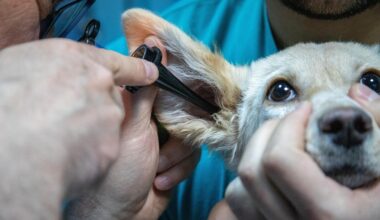How Genetic Testing Can Help Avoid Inbreeding in Cats
Inbreeding in cats is a significant issue that can lead to severe health problems and genetic disorders. Responsible breeders must prioritize the genetic diversity of their feline companions to ensure healthier litters. Genetic testing has emerged as a valuable tool for breeders to identify inherited conditions and trace lineage effectively. This testing allows breeders to make informed decisions when pairing cats, ensuring they do not breed closely related individuals. By understanding their cats’ genetic backgrounds, breeders can take proactive measures to avoid inbreeding, thus enhancing the health and vitality of future generations. In addition to genetic health issues, inbreeding can also result in behavioral problems. Cats that are bred too closely might exhibit a range of negative behaviors, creating a challenging environment for both cat and owner. Genetic testing provides insights into potential risks associated with certain pairings. It is essential for breeders to communicate openly about their testing results, creating transparency in breeding practices. This openness fosters trust with potential buyers, who increasingly seek assurances regarding the health of their future pets. Genetic testing ultimately supports a conscious breeding culture that respects feline health and ethical considerations.
Moreover, genetic testing can significantly reduce the risk of inbreeding by promoting healthier genetic pairings. Breeders can utilize DNA tests to determine carriers of specific genetic disorders within their cats. This prevents the perpetuation of these potential health issues in the breeding pool. With a clearer understanding of a cat’s genetic makeup, breeders can select mates that not only complement each other physically but also genetically. This way, they can avoid the pitfalls associated with inbreeding, thus improving the overall gene pool. By regularly testing breeding cats, breeders can identify problematic traits before making mating decisions. This practice leads to healthier cats that have fewer health problems. In addition, providing proven lineage through genetic testing can assure prospective cat owners about the expected temperament and physical health of their future cats. More buyers today are concerned about genetic health, making it essential for breeders to keep up with industry standards. Providing thorough documentation of genetic testing results not only enhances the credibility of the breeding program but also builds customer loyalty. This commitment to transparency and responsible breeding practices is vital in today’s competitive market, ensuring a brighter future for our feline friends.
Education plays a crucial role in the effective use of genetic testing in cat breeding. Breeders need to educate themselves on the various genetic tests available and what results imply for their breeding practices. Understanding the limitations and capabilities of genetic testing empowers breeders to make better decisions. Consultation with veterinarians or geneticists can provide additional insights into the best practices surrounding genetic testing. This guidance can help breeders navigate potential risks associated with inbreeding while understanding the importance of diversification within their breeding practices. Numerous resources are available online to learn more about genetics and its applications within cat breeding. Attending breeder conferences or workshops focusing on genetic health can be beneficial. Through continued education, breeders will stay informed about the latest advancements in genetic testing technology and best practices. Furthermore, sharing knowledge among breeders can cultivate a supportive community aiming for healthier cats. When breeders work together to prioritize genetic testing and breed responsibly, the long-term benefits extend to owners, veterinarians, and the entire feline population. Promoting a culture of responsibility and knowledge ensures the legacy of healthy cats for generations to come.
The Role of DNA Testing
DNA testing is central to modern cat breeding and is instrumental in combating the effects of inbreeding. By analyzing a cat’s DNA, breeders can identify genetic predispositions to certain diseases, thus avoiding pairing potentially affected individuals. This process is vital for breeding programs focused on preserving genetic diversity. Implementing DNA testing allows breeders to be proactive rather than reactive concerning health issues. This means fewer instances of hereditary diseases impacting kittens’ lives, as well as giving owners peace of mind. As more breeds face detrimental effects from inbreeding, utilizing DNA testing becomes even more critical. Breeders also benefit from understanding the genetic traits in their cats. Traits such as coat color, pattern, and even behavioral traits can be traced through lineage analysis. This understanding can help breeders in selecting mates that not only have the desired physical characteristics but also the behavior necessary for a harmonious environment. Breeders who leverage genetic testing effectively will also find their practices being met with enthusiasm from potential cat owners, thus increasing the overall success of their breeding operations. Emphasizing the importance of strong genetic backgrounds will reshape the future of cat breeding.
Furthermore, the importance of ethical breeding cannot be overstated when discussing genetic testing. Ethical considerations must guide breeding practices to ensure the welfare of the animals involved. Genetic testing contributes to these ethics by promoting informed decisions that prioritize cat health above all else. Responsible breeders must recognize the importance of avoiding genetic bottlenecks, which arise when breeding occurs within a narrowed gene pool. As a result, they segregate breeding lines to ensure diverse genetics among their cats. This ethical responsibility aligns with the increasing scrutiny cat breeders face regarding their practices. Potential buyers are more discerning and informed than ever, often demanding transparency about breeding methods and the health of the kittens they may adopt. Remaining committed to ethical practices, such as utilizing genetic testing, ensures breeders not only protect the health of their cats but also maintain their business’s reputation. Ethical standards are now essential for success and sustainability in the breeding industry. Striving for improvement through genetic testing will ultimately lead to a more genetically diverse, healthier, and happier feline populace.
The Future of Cat Breeding
Looking ahead, the future of cat breeding is promising, thanks largely to advancements in genetic testing technologies. As these technologies evolve, so do the possibilities for responsible breeding practices. Increased accessibility to genetic testing will allow more breeders to incorporate this necessary tool, further enhancing the health and genetic diversity of breeds worldwide. As awareness surrounding cat health issues rises, so does the advocacy for genetic testing among breeders. Organizations and breeding associations increasingly encourage adopting comprehensive testing protocols. Implementing these standards can ensure a more ethical and sustainable breeding industry. Future cat breeders must embrace these advancements to stay competitive and responsible in their practices. The trend indicates a growing emphasis on genetic health in breeding decisions, leading to innovations in breeding strategies. With advances in technology, it is possible to produce healthier cats better suited to endure environmental changes and longstanding hereditary issues. The path is clear for breeders who commit to the principles of responsible breeding while leveraging genetic knowledge. Optimizing genetic diversity through testing will foster healthier feline populations, achieving the common goal of well-being for cats and responsible ownership.
In conclusion, genetic testing plays an indispensable role in responsible cat breeding. By helping to avoid inbreeding, it promotes healthier cats and contributes to the overall improvement of breeds. Breeders who incorporate genetic testing into their practices set a high standard for themselves and their peers. The ethical implications of promoting health and wellness in cats cannot be overlooked. As the cat breeding landscape continues to evolve, it remains crucial for breeders to stay informed about genetic testing advancements. In doing so, they will not only contribute to their success but also to the success of future generations of cats. Today’s breeders have the opportunity to be pioneers in advancing the health and welfare of domestic cats. By fostering a culture of responsibility and knowledge sharing, they can achieve lasting change in the cat breeding industry. Providing transparency, education, and resources about genetic testing creates an informed community dedicated to the noble purpose of breeding healthy cats. Embracing these practices ensures a brighter future for our feline friends and helps secure their place in our hearts and homes.


